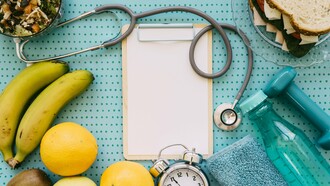Deciding to have a family is one of the biggest decisions a woman makes in her lifetime. For many women, conception happens easily, but for others, it can take months or longer to conceive. The good news is, making certain changes to your diet and lifestyle can improve your fertility and tip the scales in your favor.
If you are trying to conceive right now, or you plan to try in the near future, it’s a good idea to assess your overall health and lifestyle. The sooner you detect and address issues that could affect your fertility, the better your chances are of conceiving and having a healthy pregnancy.
Here are some key things that could be affecting your fertility, and what changes you can make to improve it.
1. Your diet
Most moms-to-be plan to change their diet and eat healthy from the moment they find out they’re pregnant, but changing your eating habits sooner could actually help you conceive. Begin by cutting out fast food, processed food, and canned food. You should also cut back on sugar, refined carbs, and caffeine.
Eating regular meals and switching to a diet that’s primarily fresh fruits and vegetables, complex carbohydrates, and lean proteins keep your blood sugar levels low, which also stabilizes insulin levels. Unstable insulin levels can lead to hormonal imbalances.
Hormones play a key role in ovulation and implantation, so taking steps to balance your hormones is crucial for fertility. Foods that are rich in Omega-3s, B vitamins, and healthy plant-based fats, like avocados, nuts, and olives, could also help to keep your hormone levels regulated.
2. Eat for your fertility type
According to a leading fertility expert, there are five types of fertility. In addition to eating a healthy diet, you should also eat the right foods for your fertility type to improve your fertility.
For example, women who tend to have dry skin, be thirsty a lot, and be underweight may be the “dry” fertility type. They should avoid spicy foods and alcohol and eat more soy and dark green leafy vegetables.
On the other hand, a woman who is always cold has a low sex drive - and poor appetite is likely the “tired” fertility type. This fertility type should eat more warming foods like soups, stews, and spices while avoiding raw or cold foods.
The “pale” fertility type is characterized by pale skin, missed periods, and insomnia. A woman with these issues should eat more iron, vitamin C, protein, and focus on highly-nutritious foods in general.
“Stuck” fertility types often have severe PMS, headaches, and are generally stressed out. This type should eat more complex carbohydrates and avoid soy and alcohol.
And finally, the “Water Logged” fertility type is someone who has issues metabolizing fluids, carries excess weight, and experiences a lot of headaches and joint pain. This type should avoid dairy, alcohol, sugar, and soy.
No matter what “type” you fit within, if you’re working through difficult fertility circumstances, don’t hesitate to seek out support. Consider joining a coaching group to walk with you as you navigate the unique circumstances of your fertility journey.
3. Smoking
Don’t wait until you are pregnant to stop smoking. The sooner you quit, the better for your fertility. Smokers undergo menopause years sooner than non-smokers, they take longer to conceive, and have a higher risk of fetal development issues.
4. Your weight
Whether you are underweight or overweight, getting to a healthy weight is important for your fertility and the success of your future pregnancy. Excess body fat can cause a woman to produce more estrogen, which affects ovulation and conception. Being very underweight or very overweight is also linked to an increased chance of miscarriage, so now’s the time to address any weight issues you might have.
5. Birth control
It can take three to six months for your body to begin ovulating regularly once you stop taking hormonal birth control. If you’re planning to conceive, you may want to stop using hormonal birth control a few months in advance or plan on giving yourself a little extra time to get pregnant.
6. Over-the-counter medications
Some common over-the-counter medications should be avoided right before and during ovulation if you’re trying to get pregnant. Antihistamines, decongestants, and diuretics are all designed to dry you out, which can affect the quality of your cervical mucus, making conception more difficult. If you are taking prescription medications, talk to your doctor to see if they could be affecting your fertility and if there is a safer alternative.
7. Lack of sleep
Sleep is super important for overall health, and it can also impact fertility. Getting seven hours of sleep each night should be a priority for healthy menstrual cycles and ovulation.
Before you resort to invasive fertility treatments and fertility drugs that come with a host of scary side effects, try making these easy changes in your diet and lifestyle. Sometimes it’s the simplest things that produce the best results!















